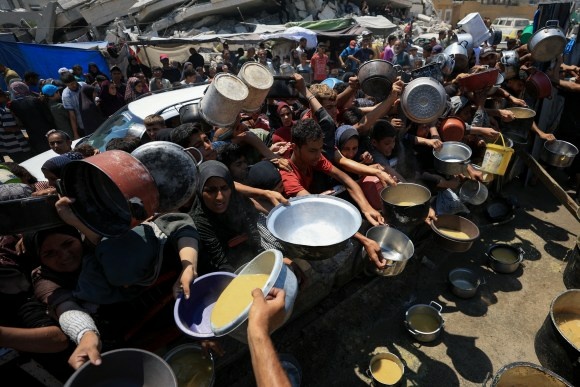
Gaza – Saba:
The Global Food Security Monitor warned on Tuesday that the worst-case scenario of a famine is actually unfolding in the Gaza Strip, where most of the population is suffering from a severe food shortage, reaching famine levels in many areas within the besieged enclave by the Israeli enemy army.
The Monitor explained in a statement that airdrops of humanitarian aid are "insufficient" to halt the rapid deterioration in living conditions, stressing that delivering aid by land remains the "most effective, safest, and fastest" way to save civilian lives.
The statement indicated that the population in Gaza is living under the burden of severe food shortages, a lack of basic medical care, and a near-total collapse of humanitarian services, exacerbating the crisis by the day.
The Monitor called on the international community to exert immediate pressure to open the crossings and facilitate the entry of food and medical aid without delay, considering that the continued closure of the crossings constitutes a fatal obstacle to relief efforts.
The Observatory confirmed that food security indicators in the Gaza Strip now portend a complete collapse.
The Observatory concluded its statement by emphasizing that "the humanitarian response cannot succeed unless immediate and unconditional access to essential supplies is permitted."
Palestinians in the Gaza Strip have been facing an unprecedented wave of hunger since Israel closed the Strip's crossings in early March and imposed severe restrictions on the entry of food, relief aid, fuel, and medicine.
Over time, Gaza's residents have exhausted all food supplies, shops have become empty, and finding a loaf of bread has become almost impossible. Meanwhile, available goods are experiencing skyrocketing prices, to the point that "death by starvation" has become one of the most severe causes of death in the Strip.
With American and European support, the Israeli enemy army has continued to commit genocidal crimes in the Gaza Strip since October 7, 2023, resulting in the martyrdom of 60,034 Palestinian civilians, the majority of whom were children and women, and the injury of 145,870 others.
To date, this is a preliminary toll, with thousands of victims still buried under the rubble and on the streets, unable to be reached by ambulances and rescue crews.
The Global Food Security Monitor warned on Tuesday that the worst-case scenario of a famine is actually unfolding in the Gaza Strip, where most of the population is suffering from a severe food shortage, reaching famine levels in many areas within the besieged enclave by the Israeli enemy army.
The Monitor explained in a statement that airdrops of humanitarian aid are "insufficient" to halt the rapid deterioration in living conditions, stressing that delivering aid by land remains the "most effective, safest, and fastest" way to save civilian lives.
The statement indicated that the population in Gaza is living under the burden of severe food shortages, a lack of basic medical care, and a near-total collapse of humanitarian services, exacerbating the crisis by the day.
The Monitor called on the international community to exert immediate pressure to open the crossings and facilitate the entry of food and medical aid without delay, considering that the continued closure of the crossings constitutes a fatal obstacle to relief efforts.
The Observatory confirmed that food security indicators in the Gaza Strip now portend a complete collapse.
The Observatory concluded its statement by emphasizing that "the humanitarian response cannot succeed unless immediate and unconditional access to essential supplies is permitted."
Palestinians in the Gaza Strip have been facing an unprecedented wave of hunger since Israel closed the Strip's crossings in early March and imposed severe restrictions on the entry of food, relief aid, fuel, and medicine.
Over time, Gaza's residents have exhausted all food supplies, shops have become empty, and finding a loaf of bread has become almost impossible. Meanwhile, available goods are experiencing skyrocketing prices, to the point that "death by starvation" has become one of the most severe causes of death in the Strip.
With American and European support, the Israeli enemy army has continued to commit genocidal crimes in the Gaza Strip since October 7, 2023, resulting in the martyrdom of 60,034 Palestinian civilians, the majority of whom were children and women, and the injury of 145,870 others.
To date, this is a preliminary toll, with thousands of victims still buried under the rubble and on the streets, unable to be reached by ambulances and rescue crews.